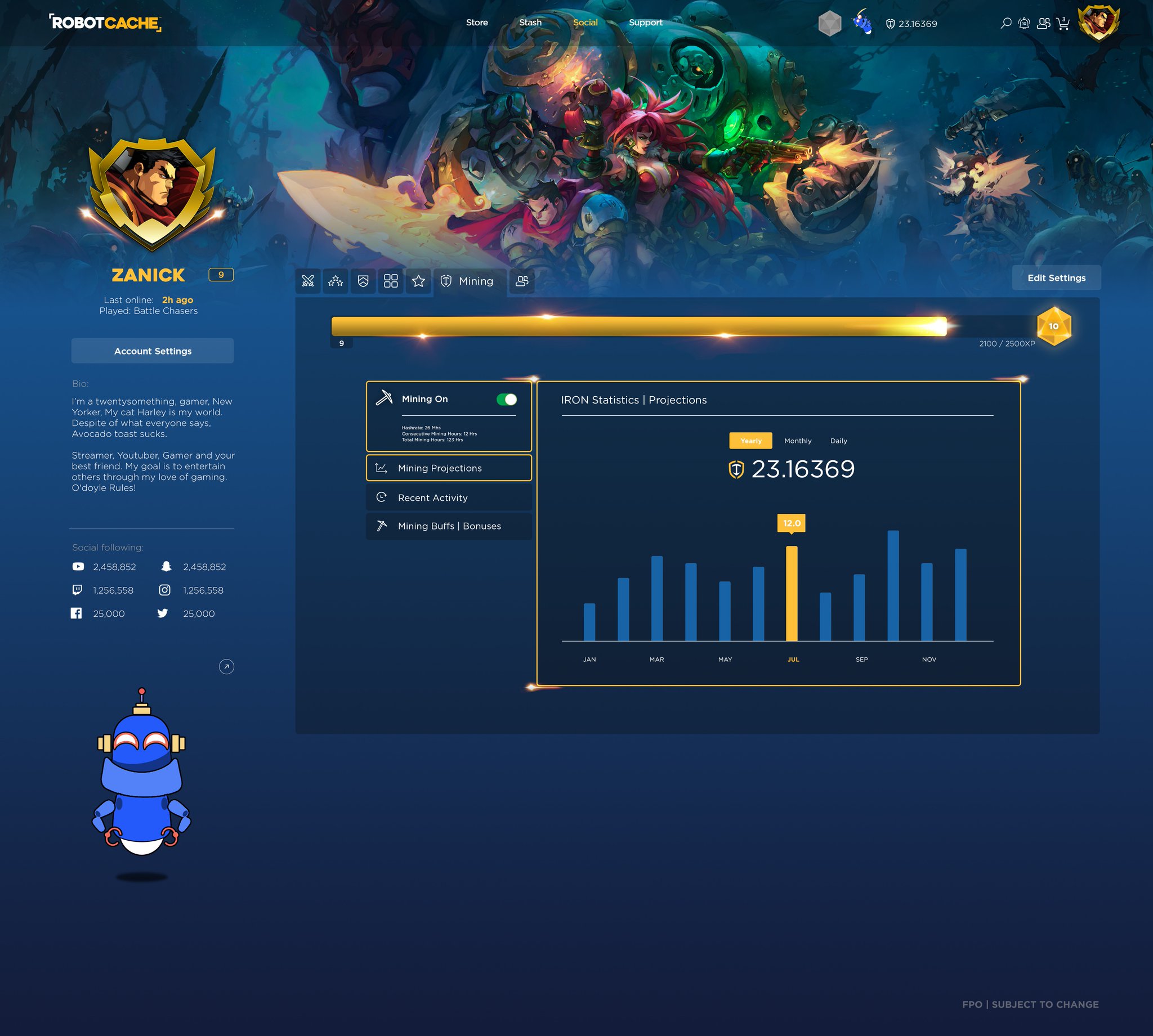Robot Cache hopes to woo PC gamers who like 'free stuff' and hate Epic's exclusives
The store, launching later this summer, will be more curated than Steam and let you sell your games back for cash.

I can't read or hear the word "blockchain" without going into full-blown skeptic mode. After cryptocurrency markets tanked last year, I thought Robot Cache, the store promising to keep your games on the blockchain and let you mine crypto to buy more, might quietly disappear. But it hasn't: After a long beta period Robot Cache will be launching in full in the next few months, with more than 1,000 games and something like 60 publishers signed on, CEO Lee Jacobson told me in a recent interview.
People say 'well are you gonna go after Steam or Epic?' No. We're not that. We're not stupid.
Lee Jacobson
After a walkthrough of Robot Cache and 30 minutes of talking to Jacobson I'm still skeptical it'll take off against the entrenched competition in PC gaming. But I did come away thinking that its use of the blockchain isn't just chasing a popular trend, and I have to admit Jacobson's most basic pitch is pretty strong: "There's a sect of people that might like the idea of getting free stuff and getting money back. That's our niche."
"People say 'well are you gonna go after Steam or Epic?' No," Jacobson told me. "We're not that. We're not stupid. We think that there's a whole group of people that haven't grown up in the Steam ecosystem that might like the idea of getting 25 percent back in cash when I'm done playing a game. I've got 300 games in my Steam library. They're all just collecting digital dust. I'd like to take 10 or 20 of those or whatever and get some money back and go buy other games. So we think there's going to be a group of people that like that idea. It doesn't need to be Steam's 125 million users a month. It just doesn't."
The gist of Robot Cache is that it's a new store that uses a blockchain certificate as a form of DRM. That certificate allows the store to track individual copies of a game so they can be resold. The price is the same as a new copy—you're really just selling a license to a digital good, so it's never really "used"—and you get a 25 percent cut put on your credit card, while the publisher gets 70 percent and the store takes 5 percent.
"Used" copies up for sale are put into a queue alongside brand new ones and the sales alternate between new and used copies, so on some sales publishers will get 95%, and on others 70%, as long as there are players selling their games back. Crucially, Jacobson says, you can't sell a game back in the first 90 days after release, when publishers make the most money.
It's a model that, in a lot of ways, seems geared towards making game publishers happy. It's The Gamestop Problem, solved. But the Robot Cache team also have some ideas that fans and critics of both Epic and Steam will likely find appealing.
First: No exclusives.
The biggest gaming news, reviews and hardware deals
Keep up to date with the most important stories and the best deals, as picked by the PC Gamer team.
"I think it's bad for the industry in general, to say 'you get to play the game for a period of time, and all you guys can't play it unless you come and get it from me,'" Jacobson said. "Whether that's right or wrong, us or anybody else. I frankly think it's BS, across the board. I don't like it. I think we'll spend money to do certain deals with great content, but we're not going to do it in a way that takes away from other gamers. I don't believe in that. We might do things where we spend money to get special content or special weapons or special skins or special levels, things that drive them to our site, but not at the expense of taking it away from gamers."
Second: Curation, including a "common sense" approach that would not allow games like Rape Day to ever go live.
"Rape or incest or school shootings, things that should be common sense, I don't know how else to say that," Jacobson said, as examples of games that the Robot Cache team would not allow on the store. Developers will pay $99 to create a backend account and upload their games, at which point they'll be reviewed. Jacobson didn't go into detail on how they'll decide what to publish and what not to publish beyond those issues, but the idea is the store won't be a free-for-all like Steam is today. "Yeah, it'll be a curated store. I think people want to be able to at least say, 'we don't want 27,000 titles.' We just don't need that."
Third: Promotions beyond just sales.
OK, this one's just as likely to appeal to devs as it is to players, but considering how easy it is for quality games to be lost and buried on Steam, this is a cool idea.
"Think Spotify playlists, so every day of the week there will be a different sort of curated list of games that would have a special promotion," said Laura Sturr, also an executive at Robot Cache. "A lot of other storefronts, the publishers and developers know that the only knob they can pull on the marketing is really deep discounts, which are great, but I think there's a lot more people can do to make sure that great games get surfaced, and that gamers are able to find them, and do it in a way that feels like e-commerce for modern times."

Fourth: "Free" stuff.
Jacobson stresses that Robot Cache's built-in crypto mining feature is opt-in, rather than opt-out. It's totally optional, and he says they plan to be "transparent about power costs" so you know if it's worth turning on the mining. But if you do (and are lucky enough not to pay your own power bill), you'll get currency you can use to buy games from the store. And there's a full gamification system built into the client going beyond basic features like achievements, which will allow you to unlock profile customizations and even coupons or "mining boosts" by playing games.
While Jacobson said Robot Cache's goal isn't to compete with Epic or Steam, it's notably not a reseller like Humble or GreenmanGaming, selling Steam keys at reduced prices. To some extent it has to compete, because its games will be sold elsewhere, too, sometimes with superior features like the Steam Workshop's mod support. But it does seem like out of the gate, Robot Cache will actually be more fully featured than Epic's store with an SDK meant to replicate most of Steamworks' major features, from multiplayer to chat to cloud saves.
I'm still skeptical that many PC gamers, given the choice, will buy a game on Robot Cache over Steam, just for the privilege of selling it back at 25 percent value. But on a $60 game that would be $15; for every new big-budget singleplayer game you tire of, you could trade it in for a new $15 indie. The store has a nice interface, slick mobile site, and features that outstrip Epic's right now, despite all that Fortnite money. The blockchain buzz may be dead, but Robot Cache will make the PC store wars even more complicated for the rest of 2019.
"We think it's going to grow over time, and I think the resell model, no matter what happens going down the road, the genie's out of the bottle," Jacobson said. "We really believe that 2-3 years from now, it'll be commonplace. Pandora's box will be open."

Wes has been covering games and hardware for more than 10 years, first at tech sites like The Wirecutter and Tested before joining the PC Gamer team in 2014. Wes plays a little bit of everything, but he'll always jump at the chance to cover emulation and Japanese games.
When he's not obsessively optimizing and re-optimizing a tangle of conveyor belts in Satisfactory (it's really becoming a problem), he's probably playing a 20-year-old Final Fantasy or some opaque ASCII roguelike. With a focus on writing and editing features, he seeks out personal stories and in-depth histories from the corners of PC gaming and its niche communities. 50% pizza by volume (deep dish, to be specific).

